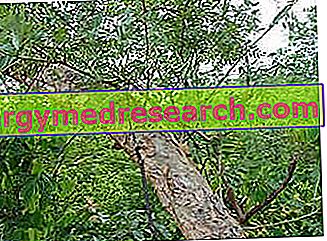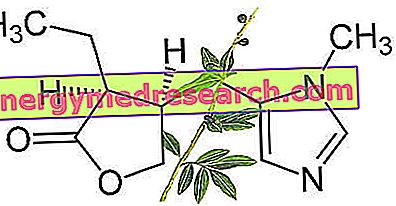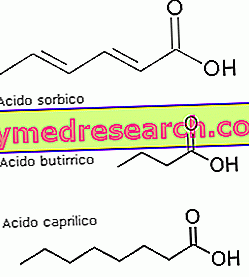Generality
The Boswellia serrata or incense tree is an arboreal plant widespread mainly in the Maghreb region, in South-East Asia and in the Indian territory.

Although the first in-depth studies documented in the literature date back to the early 1970s, the study of Boswellia serrata and its therapeutic potential for conventional medicine has intensified since the 1990s; this allowed us to identify and characterize the active ingredients responsible for its various biological actions, observed during years of animal experimentation.
In the manufacturing sector, resin oil and extracts are used to produce soaps, cosmetics, foods and beverages.
Active principles of boswellia
The essential oil, extracted from the resin exuded by the bark of this tree, is rich in numerous pentacyclic triterpene acids (active ingredients). among which the most characteristic is acetyl-11-keto-beta-boswellic acid ( AKBA ), on which most studies are focused today.
Indications
When to use boswellia?
Boswellia is especially indicated for the treatment of:
- Osteoarthritis
- Rheumatoid arthritis
- Joint pain (rheumatism)
- Bursitis and tendonitis.
Other secondary uses of Boswellia serrata include:
- Ulcerative colitis
- Abdominal pain
- Asthma
- Hay fever
- Sore throat
- Syphilis
- Painful menstruation (dysmenorrhea)
- Pimples
- Cancer.
It is recommended marginally:
- As a stimulant
- To increase urinary flow
- To emphasize menstrual flow.

Frankincense is an aromatic resin obtained from some species of the genus Boswellia. It is used in incense and perfumes
Property and Effectiveness
What benefit has Boswellia shown during the studies?
Boswellia has properties:
- Anti inflammatory
- antiarthritic
- astringent
- Expectorants
- Antiseptic.
From the molecular point of view, the use of the active principles of boswellia has proved to be useful - mainly in experimental models - in:
- Reduce the leukocyte inflammatory infiltrate in models of systemic inflammatory diseases
- Reduce the synthesis of antibodies and in particular of autoantibodies, generally involved in the genesis of autoimmune diseases
- Inhibit the activation of complement, responsible for the inflammatory damage present in conjunction with autoinflammatory and autoimmune diseases
- Reduce pain and exercise a modest sedative effect.
These effects seem to be associated with the ability of beta-boswellic acid to selectively inhibit the enzyme 5-lipoxygenase, involved in the synthesis of inflammatory mediators such as Leucotriene B4 (responsible for bronchoconstriction, platelet aggregation, chemotaxis and vasodilation).
Moreover, different experimental studies have also verified the pro-apoptotic potential of this active ingredient, thus observing the ability to inhibit the growth of leukemia cells in vitro by activating caspases.
Clinical use of Boswellia serrata
Although most of the data present in the literature refers mostly to results obtained on experimental models of disease, from the remaining clinical trials it is possible to describe for Boswellia Serrata:
- Anti-arthritic activity : observed on double-blind clinical trials, in which the daily use of some boswellia extracts (5-Loxin, ApresFLEX, formerly known as Aflapin) proved to be useful in reducing joint pain and disability scores in patients suffering from osteoarthritis. Research shows that the use of boswellia could reduce joint pain from 32% to 65%. All this led to a reduction in the use of non-steroidal anti-inflammatory drugs, with a more efficient control of the potential side effects linked to this type of therapy.
- Anti-asthmatic activity : described in different studies conducted on patients with asthma, in which therapy with boswellia resulted in a reduction in the severity of the disease with an improvement in spirometric capacity.
- Intestinal anti-inflammatory activity : observed in different studies conducted on patients suffering from gastro-intestinal inflammatory diseases, such as the rectum ulcerative colitis, Crohn's disease and iliitis, in which the daily use of boswellia guaranteed a reduction of mesalazine doses, anti-inflammatory generally used in such conditions, with a marked improvement in the complained symptomatology. Some research shows that boswellia can induce disease remission from 70% to 82% of people.
Unfortunately, all the other clinical applications advertised for boswellia are not yet supported by reliable literature data.
Doses and Mode of Use
How to use boswellia?
Still insufficient are the data present in the literature concerning the study of the pharmacokinetic and toxicological properties of Boswellia serrata, with very different dosages used between the various studies, above all on the basis of the titration of the active principle present in the extract.
Generally, considering products titrated to 30-60% in beta-boswellic acid, the intake of 300-1, 000 mg of Boswellia serrata dry extract per day should already be sufficient to guarantee a first therapeutic effect.
For the treatment of osteoarthritis we recommend:
- 100-250 mg / day of specific extract (5-Loxin); 100 mg per day of another specific extract (ApresFLEX, formerly known as Aflapin)
- 333 mg / day of another specific extract.
- For the treatment of ulcerative colitis, 300-350 mg is recommended 3 times a day.
Side effects
If taken by mouth and for up to 6 months, boswellia is probably safe for most adults.
When applied to the skin, boswellia is probably safe for up to 30 days of treatment.
For atopic patients, the use of this supplement could result in the appearance of:
- Gastrointestinal reactions (pain, nausea and diarrhea), when taken orally
- Typical skin hypersensitivity of allergy, if used externally.
Contraindications
When should boswellia not be used?
Boswellic acid is considered safe, as it is also present in food; however it is necessary to avoid it at pharmacological concentrations in case of pregnancy and lactation.
Pharmacological Interactions
What drugs or foods can modify the effect of boswellia?
Boswellia serrata can interact with some oral anticoagulants.
Precautions for Use
What do you need to know before taking boswellia?
Given the presence of side effects and the possibility of some potential drug interactions, it would be advisable to consult your doctor before taking boswellia supplements.
Studies and Bibliography
- Brandt KD, Palmoski MJ. Effects of salicylates and other nonsteroidal anti-inflammatory drugs on articular cartilage. Am J Med 1984; 77: 65-69.
- Reddy GK, Chandrakasan G, Dhar SC. Studies on the metabolism of glycosaminoglycans under the influence of new herbal anti-inflammatory agents. Biochem Pharmacol 1989; 38: 3527-3534.
- Krieglstein CF, Anthoni C, Rijcken EJ, et al. Acetyl-11-keto-beta-boswellic acid, a constituent of a herbal medicine from Boswellia serrata resin, attenuates experimental ileitis. Int J Colorectal Dis2001; 16: 88-95.
- Gupta I, Parihar A, Malhotra P, et al. Effects of Boswellia serrata gum resin in patients with ulcerative colitis. Eur J Med Res 1997; 2: 37-43.
- Gupta I, Parihar A, Malhotra P, et al. Effects of gum resin of Boswellia serrata in patients with chronic colitis. Planta Med 2001; 67: 391-395.
- Gerhardt H, Seifert F, Buvari P, et al. Therapy of active Crohn's disease with Boswellia serrata extract H 15. Z Gastroenterol 2001; 39: 11-17.
- Gupta I, Gupta V, Parihar A, et al. Effects of Boswellia serrata gum in patients with bronchial asthma: results of a double-blind, placebo-controlled, 6-week clinical study. Eur J Med Res 1998; 3: 511-514.
- Kimmatkar N, Thawani V, Hingorani L, Khiyani R. Effective and tolerability of Boswellia serrata extract in treatment of osteoarthritis of knee - a randomized double blind placebo controlled trial. Phytomedicine 2003; 10: 3-7. Kulkarni RR, Patki PS, Jog VP, et al. Treatment of osteoarthritis with a herbomineral formulation: double-blind, placebo-controlled, cross-over study. J Ethnopharmacol 1991; 33: 91-95.
- Sander O, Herborn G, Rau R. Is H15 (resin extract of Boswellia serrata, "incense") a useful supplement to established drug therapy of chronic polyarthritis? Results of a double-blind pilot study. Z Rheumatol1998; 57: 11-16.
- Boswellia resin: from religious ceremonies to medical uses; a reviewof in-vitro, in-vivo and clinical trials. Moussaieff A, Mechoulam R. J Pharm Pharmacol. 2009 Oct; 61 (10): 1281-93. doi: 10.1211 / jpp / 61.10.0003.Review.
- Boswellia serrata: an overall assessment of in vitro, preclinical, pharmacokinetic and clinical data. Abdel-Tawab M, Werz O, Schubert-Zsilavecz M. Clin Pharmacokinet. 2011 Jun; 50 (6): 349-69.



